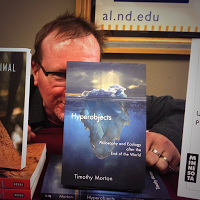I’ve just finished Tim Morton’s Hyperobjects, a great, creative, and stimulating book, and it’s got me thinking (again!) about my favorite thing. I wonder if a longer history of the massively distributed, viscous, mind-bending things Tim calls hyperobjects might include my salty old friend Ocean?
In general it seems to me that the many excellent new responses to the global we find in contemporary theory — Sloterdijk’s spherologie, Spivak’s “planetarity,” Nancy’s “mondialisation,” Heise’s “sense of planet,” &c — could stand to splash around a little more in the salt-water element that covers most of the surface of our globe. Morton’s “hyperobjects” seems especially well suited for an oceanic dip. It’s not that I want to drag everybody’s theory into the water with me — though there’s plenty of room! — but the ideas of ocean that have for a long time been central to literary culture — the “genius of the sea” that sings from Homer to Wallace Stevens and beyond — speak so clearly to the conceptual and physical vastness that Morton and others are theorizing.
What happens if we get Hyperobjects wet and salty?
Here are a few quick ideas, keyed off of the book’s organizing terms and relying mostly on premodern literary sources:
Viscosity: Water thickens most dramatically into ice, as in the gorgeous iceberg on the cover of Morton’s book. Salt water especially exerts global force through its thickness, its capacity as a massive heat-sink, and its slow, surging erosion. We feel its power all around our histories and bodies; it (to borrow a term) “sticks” (1).
Nonlocality: This seems the easiest of the bunch. What is less local than the ocean? When I dip my foot into the cold waters of Long Island Sound while walking the dogs, it’s the same World Ocean that bathes sunburnt bodies in Sydney, benthic fish in the deep Atlantic, and fisherman in Indonesia. Not to mention Aeneas, Admiral Nelson, and Diana Nyad.
Temporal Undulation: I think of solitary Ishmael on the coffin, washed and expelled by the whirlpool, bobbing back into history, “and the great shroud of the sea rolled on as it rolled five thousand years ago.” Or of Odysseus, stranded with lovely Calypso, waiting for the age of epic to end. No space on our planet is more in and out of history.
Phasing: If “hyperobjects are big enough relative to us that they cause us to be aware of the rupture” (78) in space and time, what Morton also calls “the Rift,” isn’t seeing the ocean as close as most of us come to this insight? Listen to a few of Shakespeare’s coinages: “boundless as the sea” “the vasty deep” “the wild and wasteful ocean” “multitudinous seas.” Big enough to get out of phase.
Interobjectivity: Here’s Beowulf getting interobjective in the surf, courtesy of Thomas Meyer: “You swam, / sea’s form wreathed your arms, / your hands / thrashed their way along the sea’s roads as / Ocean’s fork / tossed you into sea’s boiling floods & / winter’s waves crashed upon sea’s streams. Water / held your body” (74).
Hypocrisy: “Inside the ocean we are always in the wrong” (Morton 136, h/t Kierkegaard).
Weakness: “Say you can swim,” laments Queen Margaret, “alas, ’tis but a while” (3Henry6 5.4.29). No one swims forever!
Lameness: Might the “saving lameness of the Rift” (196) be a description of the uncanny homelessness of floating? Of being a mostly-landed creature immersed in a mostly-watery planet?
“Ecology is about intimacy” (139). Sounds like Swimmer Poetics to me! (Better link forthcoming)
“We need to get out of the persuasion business and start getting into the magic business” (181), sez Tim. I’m splashing right along with him.
Thinking the ocean as hyperobject has me re-thinking my idea for an Object Lessons essay about the Ocean, though right now I don’t have time to get to it.

“Thinking the ocean as hyperobject has me re-thinking my idea for an Object Lessons essay about the Ocean, though right now I don’t have time to get to it.”
How about now?
Almost now! This fall, certainly.